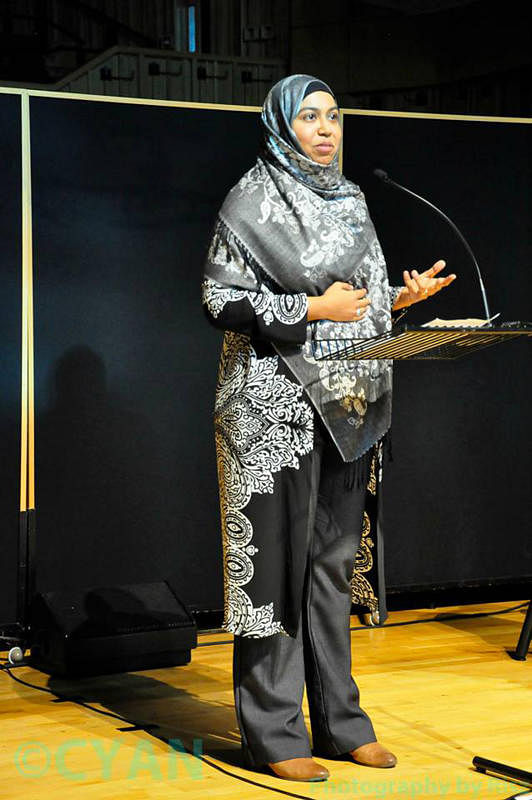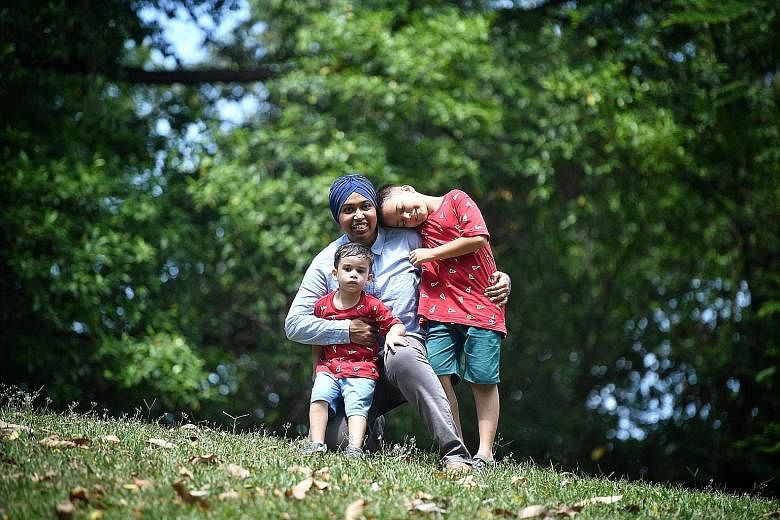More than 13 years ago, Shereen Aziz-Williams visited a cousin in Wales and was mortified when the latter insisted on setting her up with a young man.
Then a 21-year-old accountancy undergraduate in Singapore Management University (SMU), she was neither looking for a boyfriend, nor a husband. So she just waved to him from the top of the stairs when he came to her cousin's home and then disappeared into her bedroom.
End of story, she thought. Kismet, however, had a big surprise - one which upended her life spectacularly.
A few days later, she met the man's elder brother by chance. Their chemistry was instantaneous. In just two weeks, they were seriously entertaining marriage. A year later, one day before she took her two final exam papers, they tied the knot.
Her life turned even more unexpected corners after she moved to Wales in 2005.
She was offered a job by one of the Big Four accounting firms but instead, became a regional community cohesion coordinator, battling hate crime, terrorism and inequality in Wales.
The 34-year-old is so good at what she does that she was recently made an honorary Member Of The Order Of The British Empire (MBE). The honour is given for outstanding achievements or service to the community.
"If I hadn't visited my cousin, I'd probably be working in accounting, possibly leading a very uneventful life," adds Mrs Williams, who was home recently to visit her family.
The only girl and the eldest of four children, she grew up in Bedok and Tampines. Her mother, also an accountancy graduate, is a civil servant; her father is an "odd job man" who helps friends in different businesses and projects.
"They were standard Singaporean parents and had expectations of me. So I worked hard, passed exams and got the grades I was supposed to," says the former student of Tanjong Katong Girls' School and Anglo-Chinese Junior College.
Blessed with a big personality, she was also a prefect, debater and performer.
Not quite sure what she wanted for a career, she decided to follow her mother's footsteps and was one of SMU's pioneer batch of accountancy students. "I reckoned that if I got stuck, mum would be able to help me," she says.
In SMU, she became even more effervescent, tackling theatre with gusto and singing in an all-girl band named Scarlet.
In her third year in 2004, she went on a six-month student exchange programme in Denmark where she lived in a house with 39 international students. At the Copenhagen Business School, the avid Juventus Football Club fan chose to explore subjects such as sports economics.

She backpacked through Europe, went to many music festivals and realised there were "lots of opportunities and many different career options. I realised I did not have to necessarily become an accountant".
When the programme ended, she had a couple of weeks to spare before joining her mother who had planned a holiday in London with her two good friends from Brunei.
"My mother suggested I stay with my cousin in Wales before meeting her in London," she recalls.
That visit changed her life. For that was when she met Mr Owen Williams, a Muslim convert who was then 29 years old, divorced with a three-year-old daughter and working in an NGO focusing on environmental issues.
Over the next couple of weeks, the couple met several times.
"He'd find all sorts of excuses to come to the house. Once, he even brought his mother, saying that she loved to travel and might want to visit Singapore," she recalls.
Breaking the news to her mother was nerve-racking.
"Straightaway, she said I was too young. But I pointed out to her that she also met my father when she was in uni. I told her to meet him first," she says.
Her mother went to Wales to meet Mr Williams. To her relief, the meeting went well. But just to make sure, her mother asked Mr Williams to go to London to be interrogated by her best friend's husband.
Mrs Williams recalls: "It ended with my Godpa telling him: 'If you treat her badly, I will come after you'."
Over the next 11 months, the couple met only once while she finished her last year in university.
"We used a lot of phone cards. He's kept every single one he used," she says with a smile.
He flew over and they got married on May 30, 2005, in the midst of her final exams.
"It was the only time slot we could find which matched his leave," she says, adding that they had a proper ceremony a couple of months later.
She flew out to Wales in July 2005 to begin her new life.
"I was emotional about leaving family, friends and all things familiar. There was a lot of trepidation but also excitement," she says.
Fearing that she might feel homesick if she did not have anything to do, her husband - who also was made an MBE in 2015 for community work - volunteered her services as treasurer of a newly set-up volunteer group helping young people from black and minority ethnic backgrounds in Swansea.
The UK was then rocked by a series of coordinated suicide bomb attacks in London, which killed 56 people and injured nearly 800 others on July 7, 2005.
Because Mr Williams was involved in an interfaith dialogue in Swansea, he asked his wife to help organise a remembrance for all victims of the attack.
"I arrived in Wales on a weekend. By Monday, I was chairing the first meeting for the interfaith event. Don't forget I'm a product of the Singapore system. I am very efficient and resourceful," she quips.
In less than a month, on Sept 11, 2005, she organised Swansea's first remembrance for victims of terror. The event, held at the University of Swansea, was attended by representatives from different faiths and attracted 400 people.
In the meantime, she applied for accounting-related jobs and got an offer from major accounting firm PwC. The job required her to have a driving licence, which she did not have then. "They said to come back once I have it," she says.
Life, however, had other plans for her. An opportunity to become the community curator for a national festival of Muslim culture came along. It involved engaging with diverse Muslim families, originally from Saudi Arabia, Bangladesh and other Muslim countries, borrowing items and writing narratives for an exhibition.
It led to other jobs, including development officer for a charitable organisation, The Council of Ethnic Minority Organisations, where she worked with policymakers on equality and diversity policies for minority communities in Wales. At 24, she became the organisation's youngest director.
In 2009, she had her first son Iesu. When he was four months old, she took him back to Singapore and left him in the care of her parents until he was three and ready for nursery in Wales.
"I didn't have family in Wales and I didn't want him not to have a connection with my family here. If he was with me, he won't know Singapore," she says, adding that her grandmother looked after her for a couple of years, not long after she was born, when her parents went to work in Brunei.
"I Skyped with him all the time. I'd visit twice a year; my mother brought him back to Wales, too. Iesu was the first baby in our row of flats in Tampines and my parents' Chinese neighbours would borrow him for an hour every day. Now he's like an MP when he comes back; everybody knows him and he visits everyone," adds Mrs Williams, who did the same with her second son, Selyf, who is three.
After Iesu came along, she became Newport City Council's community cohesion lead officer in Newport. Her job involved handling tension and other issues of integration when new communities moved into established ones.
What started out as a part-time job is now a full-time one. She is the regional community cohesion coordinator, working with government leaders and councillors to oversee the resettlement of Syrian refugees in two Welsh counties, counter-terrorism programmes, as well as initiatives to push diversity and gender equality.
Along the way, a friend asked her to help out with the Henna Foundation, a charity that specialises in helping Muslim families. As its director of strategy, she found herself working on cases ranging from domestic abuse to violence against women and girls.
"I'd come to the office and see a 14-year-old girl with needle marks, turning to drugs to deal with the trauma of sexual abuse," she says with a sigh.
She also worked on an honour killing case in which a teen was killed by her parents. They suffocated the girl by wrapping her face and then dumping her body because they felt she had got into an inappropriate relationship and set a bad example for her siblings.
"It was a wake-up call to acknowledge how privileged my life had been. Not everyone in positions of privilege realise that. It hit home how lucky I was and that since I am in a position to help, I really should."
"During the 21/2 years when I did front-line case work, I'd never cried so much in my life," says Mrs Williams, who still volunteers at Henna but focuses on funding and other administrative issues.
Made the first female Muslim chaplain of a Swedish university in 2010, her work has earned her a host of community awards and a lot of respect from policymakers and community members. It has taken her to conferences in Europe, where she speaks on anti-hate and integration issues.
But it has also made her a target for insidious threats. She recently had a police marker put on her home after a Quran teacher was found guilty of sexually abusing several girls.
"His supporters started a rumour that we were the ones who got the girls to lie to the court and the court was corrupt. Because I had to do the press around it, my name was linked to the case and I received threats to watch my back.
"It scares me a bit but I also believe if it's time to go, it's time to go," says Mrs Williams, who was once spat on for wearing a tudung.
She is no pushover, she says. Once, before giving a talk on awareness, she had an encounter with a technician doing her audio-visual set-up.
"He asked me if I had a bomb in my bag. I shot back and said: 'Do you have child porn in yours? You do realise that the typical paedophile is a white middle-aged male?' He got upset and told me what I said was not appropriate.
"I told him it was not appropriate for him to suggest I have a bomb in my bag too because I am Muslim."
Her honorary MBE (honorary because she is not a citizen) also recognises her contributions in interfaith work.
The founder of an interfaith forum says: "In the past, a lot of the interfaith work involved elderly men getting together and having tea. How are they going to have an impact on people like me who are struggling with issues of faith and crisis?"
The approach she and her peers take is more progressive. They have retreats with people from other faiths, organise visits to mosques and other places of worship and engage in frank discussions about Islam and other religions.
Wales, she says, has been good to her. "It's given me a Welsh Prince Charming and an adventure. It's definitely been a nice turn of events. I can't imagine not doing this or living my life this way."


